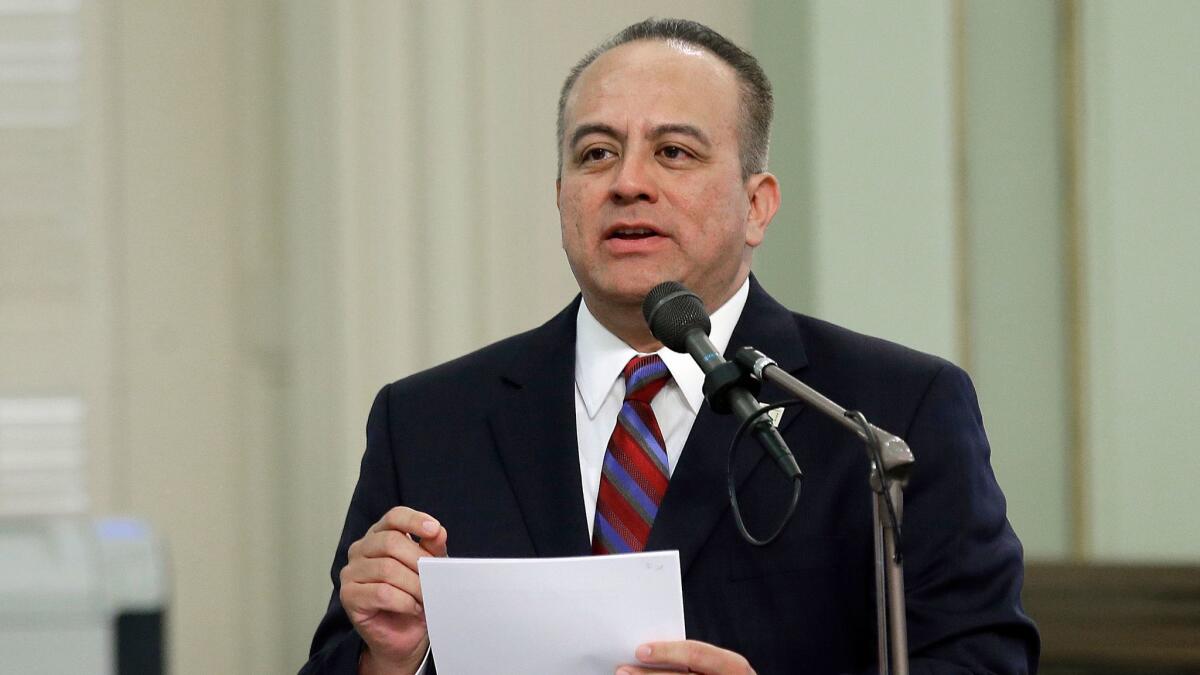Editorial: How do we deal with allegedly misbehaving legislators like Raul Bocanegra?

Should three state lawmakers under a cloud of sexual misconduct allegations — Assemblyman Raul Bocanegra, Assemblyman Devon Mathis and state Sen. Tony Mendoza — resign from the Legislature?
Some people are calling for just that, saying that the accusations of sexual misconduct and harassment lodged against the three are so serious they can’t effectively do their job. On Monday, Bocanegra (D-Pacoima) pledged to resign, but not until September, shortly before his term expires. His announcement came just hours before the Los Angeles Times broke the news that half a dozen women say Bocanegra inappropriately touched or communicated with them.
The accusations are troubling, but it’s premature to pressure these legislators to step down. The investigations into Bocanegra and Mendoza (D-Artesia), who is accused of inappropriate behavior by two young staffers, are still open. It’s not clear whether the Assembly Rules Committee is still investigating Mathis (R-Visalia) now that the Sacramento Police Department closed its probe of a sexual assault accusation made by a conservative blogger.
Anyone under investigation for serious sexual misconduct involving staff ought to be off the job — suspended with pay, that is — until the case is resolved.
What should happen to them in the meantime, if anything? It’s not reasonable to summarily discharge elected officials after mere accusations of misconduct, but should they be suspended, with or without pay? Should they be expelled or censured by their peers? Should it be up to voters, and voters alone, to unseat an elected official?
Here’s one policy that should be obvious: Anyone under investigation for serious sexual misconduct involving staff ought to be off the job — suspended with pay, that is — until the case is resolved. The Legislature isn’t just a lawmaking body; it is the employer of hundreds of people who should be able to do their jobs without fear of sexual predators.
Beyond that, however, we have no good answers. The California Legislature lacks clear and consistent guidelines for how to deal with a lawmaker who has been convicted of a crime, let alone accused of sexual misconduct. Without such guidelines, punishments appear to be situational and meted out in accordance with the inclination of the leadership and the popularity of the accused. That’s unacceptable.
The uneven application of punishment was evident in 2014 when a trio of Democratic state senators — Leland Yee, Ronald S. Calderon and Roderick D. Wright — ran afoul with the law. California law gives each house of the Legislature the power to oust one of its own with a two-thirds vote. Yet after Wright was convicted of perjury and voter fraud, the Senate chose to take no action against the well-liked politician. It wasn’t until the other two were under investigation for corruption that the Senate voted to suspend all three with pay. Ultimately, it was the right decision to remove them from their duties, and all three eventually resigned.
There’s danger of inconsistency in the current cases as well. In fact, it’s hard not to wonder if these accusations would have been dealt with quietly and privately were it not for the scores of women who came forth in recent weeks to decry the “boys’ club” culture in Sacramento.
Assembly Speaker Anthony Rendon (D-Paramount) launched an independent investigation (as opposed to one by the secretive rules committee) and removed Bocanegra from committee assignments and his position as majority whip. If the investigation affirms the accusations against Bocanegra, Rendon said, he will start expulsion proceedings.
What about Mathis, now that the police investigation is closed? What should people expect, if anything? If the Assembly continues its investigation and finds nothing, should it publicly exonerate him?
As for Mendoza, state Senate President Pro Tem Kevin de León (D-Los Angeles) said he planned to strip the senator of his committee and board assignments and announced an independent probe. But De León has not said what might happen to Mendoza if the accusations of inappropriate behavior are deemed credible.
In late November, the Assembly plans a hearing to discuss how to revise its approach to sexual harassment. That would be a good time to work out a policy describing how members should conduct themselves while in Sacramento and outline what the penalties are if they violate it. The Senate should do the same as an outside firm reviews its sexual harassment policies. This soul searching is healthy, but it must produce more than just empty gestures.
Follow the Opinion section on Twitter @latimesopinion and Facebook
More to Read
A cure for the common opinion
Get thought-provoking perspectives with our weekly newsletter.
You may occasionally receive promotional content from the Los Angeles Times.






